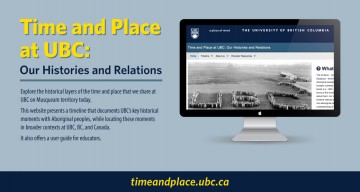We are happy to announce the launch of a new educational resource website, “Time and Place at UBC: Our Histories and Relations”! This website presents a timeline that documents UBC’s key historical moments with Aboriginal peoples, while locating these moments in broader contexts at UBC, BC, and Canada. It was developed with an aim to develop our awareness of the histories of this place at UBC, on the traditional, ancestral, and unceded territory of the Musqueam people. Although the special focus of the timeline is on UBC’s relationships with Aboriginal peoples, it is not only about Aboriginal peoples, nor is it only about the past. Rather, the timeline intends to speak to us all – Aboriginal and non-Aboriginal peoples alike at UBC – to build a shared understanding of the specificities and complexity of the time and place that we share today.

One of the unique features of the timeline is that it presents multiple contexts of a particular event or time period. These layers are presented in three rows in the timeline – Canada/BC, UBC, and UBC Aboriginal Engagement. For example, the history of the establishment of UBC in the early 1900s is well documented in the University Archives and publications, but the history is seldom told in relation to Aboriginal peoples. For instance, when you look at 1922 in the “UBC” row of the timeline, you will see that there was a province-wide student campaign that successfully led the government to authorize a $1.5 million loan to complete the construction of the UBC Point Grey campus. This story alone may be simply seen as “progress” in the history of education in BC and Canada. However, we gain a different insight when we juxtapose this demand for education with another contradicting demand for education in Canada. Two years prior to this student campaign for UBC, in 1920 in the “Canada/BC” row of the timeline, you will see that Indian Residential School attendance became mandatory for First Nations, and later Inuit and Métis, children between the ages of 7 and 15 across Canada.
When you fast-forward about 90 years on the timeline, on September 18, 2013 in the “UBC Aboriginal Engagement” row, you will find that the University suspended most classes to allow UBC community members to participate in the West Coast National Event of the Truth and Reconciliation Commission (TRC) and the other events around the city supporting it. This was the first suspension of classes since Second World War.
By showing these contradicting, overlapping, and intertwining historical trajectories of UBC, BC, and Canada, the timeline invites us to reflect on how history has shaped us – our sense of identity and self-worth, life opportunities and lack thereof, and relationships with one another at UBC and in broader society today. The abovementioned suspension of classes at UBC last September has significant weight in UBC’s history with respect to Aboriginal peoples. However, it marks only a beginning, not a celebratory closure, for us as UBC community members to bring our collective engagement with creating a space for further dialogue on campus about the Indian Residential School System and its legacy.
This new resource website also offers a user guide for educators to help educators in different teaching settings design, facilitate, and support a learning process using the timeline. The guide includes various learning activities, and you can also find additional resources to complement your teaching needs.
Please come and learn more about this new resource and others that we have developed at CTLT to support the UBC community in gaining a better understanding of Indigenous issues and ways to discuss them in the classroom and workplace. On September 26th, we will be hosting the Aboriginal Initiatives Open House where you will have the opportunity to learn more about our services and resources. In addition, on November 19th, we will be offering a Classroom Climate series session, Uncovering Indigenous Stories at this “Place of Mind,” where you will have the opportunity to learn about new digital resources that we have developed to revitalize local histories on campus and integrate them into our teaching and learning.
Acknowledgement – This resource was developed in collaboration with numerous UBC community members on the traditional, ancestral, and unceded territory of the Musqueam people. As a developer of this resource, I, Hanae Tsukada, would like to take this opportunity to express my deep gratitude for each and every one of the collaborators at CTLT and the First Nations House of Learning. (Please see here for full acknowledgements)
This article was published in the September 2014 CTLT Newsletter, Dialogues. Below is a list of articles included in the issue:
- Celebrate Learning Week 2014
- Reshaping the Campus Experience: Learning Design Environment Workshop
- ECAR Study of Faculty and Technology 2014
- Time and Place at UBC: Our Histories and Relations (currently viewing)
- Cuban Delights! Visit Cuba in April/May 2015
Find out more about the CTLT Newsletter, Dialogues.

